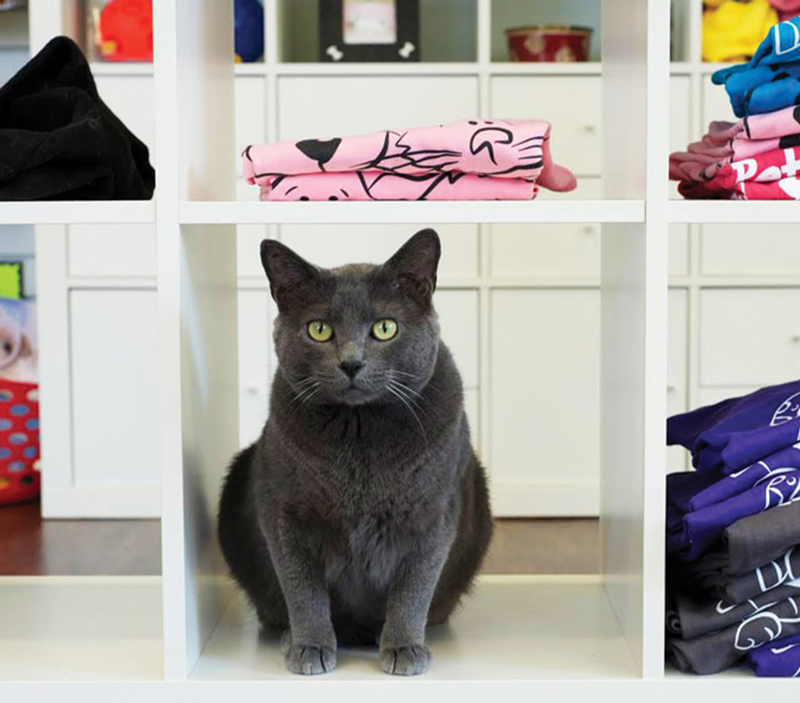In June of 2014, Kathy Meece and her five German shepherds could be found living in the woods under the intersection of Linn and West Eighth streets. Her heart condition had put her out of work and back on the street — a place she’d been familiar with since she was 10 years old.
The harsh conditions of outdoor living led to her youngest dog, Goliath, getting an ear infection, but Meece was unable to afford any kind of traditional veterinary care. She ran into a stranger on the street who told her of a place that could possibly help. A week later, Meece stepped through the doors of Pets in Need of Greater Cincinnati, a nonprofit that provides low-cost veterinary care for the pets of low-income families. Pets in Need serves locals, like Meece, whose household income is less than 150 percent of the federal poverty level.
In 2009, Pets in Need’s current executive director Ann Hill was the executive director at the United Coalition for Animals (UCAN), a nonprofit spay and neuter clinic in Camp Washington. Hill was also involved with Pet Health Day, a semi-annual event at the Freestore Foodbank that offered basic vaccines and vet exams by volunteer veterinarians and staff. In 2008-2009, the Freestore’s facility was under renovations and no longer had the space to hold Pet Health Day. With the joint effort of UCAN, the Freestore and veterinarian Dr. Zeke Zekoff, a grant application was put toward a new program that would do more than just spay and neuter to help those who couldn’t afford more when it came to pet care. With an available space to work from at Freestore, Pets in Need was born.
It wasn’t until 2012 that service demands were through the roof, with Pets in Need exceeding part-time hours and in need of a more permanent space.
Hill purchased a building down the street to rehabilitate, and in April 2013, Pets in Need opened its very own spacious facility, providing biweekly clinics and serving more than 200 animals. Today, the number of pets enrolled in the organization has reached more than 4,000.
“The goal is to keep pets together with the people who love them, and allow them to be responsible pet owners and keep their pets out of a shelter,” Hill says. “For every pet we keep in a home, that’s a space they’re not taking up in a shelter, or an animal that’s not going to be abandoned, neglected or abused.”
While Pets in Need helps pet owners provide care, the organization does not encourage them to take in any more pets.
“We want to help as many people as we can, as well as pets,” Hill says. Pets in Need is able to achieve this with a core group of committed staff members and volunteers.
Some of the volunteer roles include working hands-on in the clinic, fundraising, cleaning the facility and much more.
“For a volunteer to be effective, that volunteer has to want to be here,” Hill says. “They have to want to do their job.”
One of Pets in Need’s regular volunteers is Lexie Stevenson, who spends two days a week at the organization running field calls, checking in clients at the front desk and helping wherever else she is needed.
In 2014, when Meece first reached out to Pets In Need, Stevenson answered the call. Meece explained her lack of transportation.
“We made an appointment for the first dog to come, and I said I would pick her up,” Stevenson says. “I met her at the Shell station, got her some food and she had (Goliath) seen.” Eventually, all five dogs made it into Pets in Need for treatment.
Stevenson and Meece have continued a relationship ever since. “If my dogs are out of food, and she knows I already got the food for this month, she’ll go to a food mill and get my dogs some Diamond puppy food because she knows my dogs like that,” Meece says. Pets in Need provides a monthly stipend of pet food when available.
Today, Meece is no longer homeless and has found a place located directly behind the organization. “I wanted a place close to here,” she says. “I’m always thinking about my dogs.”
Like many of the other Pets in Need customers from all walks of life, Meece will do anything to keep her pets close. “(My dogs) are my best friends,” she says.
For more information on PETS IN NEED OF GREATER CINCINNATI, visit pincincinnati.org.






